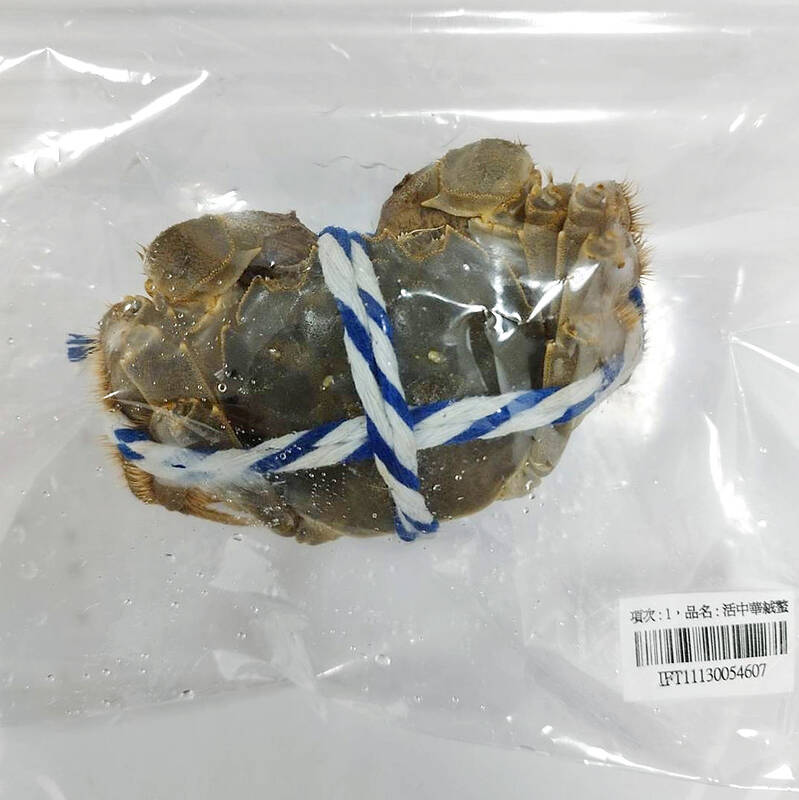Customs officials have seized 6,400kg of live Chinese mitten crabs at the border after the batch was found to contain excess levels of dioxins, the Food and Drug Administration (FDA) said yesterday.
It was the first such seizure in two years, the agency said.
The crabs, imported by Shuo Hsuan International Trading Ltd, was found to contain dioxin at a level of 10.4 picograms per gram (pg/g) wet weight, and dioxins and dioxin-like polychlorinated biphenyls (DL-PCBs) of 10.8pg/g wet weight.

Photo courtesy of the Food and Drug Administration
The levels are much higher than the permissible level of dioxin at 3.5pg/g wet weight, and combined permissible total for dioxins and DL-PCBs at 6.5pg/g wet weight, FDA Northern Center head Chen Ching-yu (陳慶裕) told reporters.
As part of its efforts to step up inspections at the source, the FDA indefinitely suspended applications for import inspections by the aquafarm in Shandong Province where the crabs came from, effective immediately.
Since October last year, the customs has rejected 25 shipments of mitten crabs from China as a result of batch-by-batch inspections at the border, Chen said.
RICE, MANDARINS
Also on the FDA’s 17-item list of seized items were white rice from India, mandarins from South Korea, sea urchin gastrulas from Mexico and fresh strawberries from Japan.
The substandard or polluted food shipments have been destroyed or returned to their country of origin, Chen said.
Last month, six shipments of fresh strawberries imported from Japan by Chuan Yong Fruit Co Ltd were found to contain two pesticides — flonicamid and cyantraniliprole, traces of which are not permitted in strawberries in Taiwan.
Imports of fresh Japanese strawberries have been subject to a 20 to 50 percent random inspection rate since early last year, when such shipments were frequently found to contain high levels of pesticide residue.

Prosecutors in New Taipei City yesterday indicted 31 individuals affiliated with the Chinese Nationalist Party (KMT) for allegedly forging thousands of signatures in recall campaigns targeting three Democratic Progressive Party (DPP) lawmakers. The indictments stem from investigations launched earlier this year after DPP lawmakers Su Chiao-hui (蘇巧慧) and Lee Kuen-cheng (李坤城) filed criminal complaints accusing campaign organizers of submitting false signatures in recall petitions against them. According to the New Taipei District Prosecutors Office, a total of 2,566 forged recall proposal forms in the initial proposer petition were found during the probe. Among those

ECHOVIRUS 11: The rate of enterovirus infections in northern Taiwan increased last week, with a four-year-old girl developing acute flaccid paralysis, the CDC said Two imported cases of chikungunya fever were reported last week, raising the total this year to 13 cases — the most for the same period in 18 years, the Centers for Disease Control (CDC) said yesterday. The two cases were a Taiwanese and a foreign national who both arrived from Indonesia, CDC Epidemic Intelligence Center Deputy Director Lee Chia-lin (李佳琳) said. The 13 cases reported this year are the most for the same period since chikungunya was added to the list of notifiable communicable diseases in October 2007, she said, adding that all the cases this year were imported, including 11 from

China might accelerate its strategic actions toward Taiwan, the South China Sea and across the first island chain, after the US officially entered a military conflict with Iran, as Beijing would perceive Washington as incapable of fighting a two-front war, a military expert said yesterday. The US’ ongoing conflict with Iran is not merely an act of retaliation or a “delaying tactic,” but a strategic military campaign aimed at dismantling Tehran’s nuclear capabilities and reshaping the regional order in the Middle East, said National Defense University distinguished adjunct lecturer Holmes Liao (廖宏祥), former McDonnell Douglas Aerospace representative in Taiwan. If

The Mainland Affairs Council (MAC) today condemned the Chinese Communist Party (CCP) after the Czech officials confirmed that Chinese agents had surveilled Vice President Hsiao Bi-khim (蕭美琴) during her visit to Prague in March last year. Czech Military Intelligence director Petr Bartovsky yesterday said that Chinese operatives had attempted to create the conditions to carry out a demonstrative incident involving Hsiao, going as far as to plan a collision with her car. Hsiao was vice president-elect at the time. The MAC said that it has requested an explanation and demanded a public apology from Beijing. The CCP has repeatedly ignored the desires